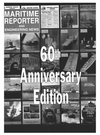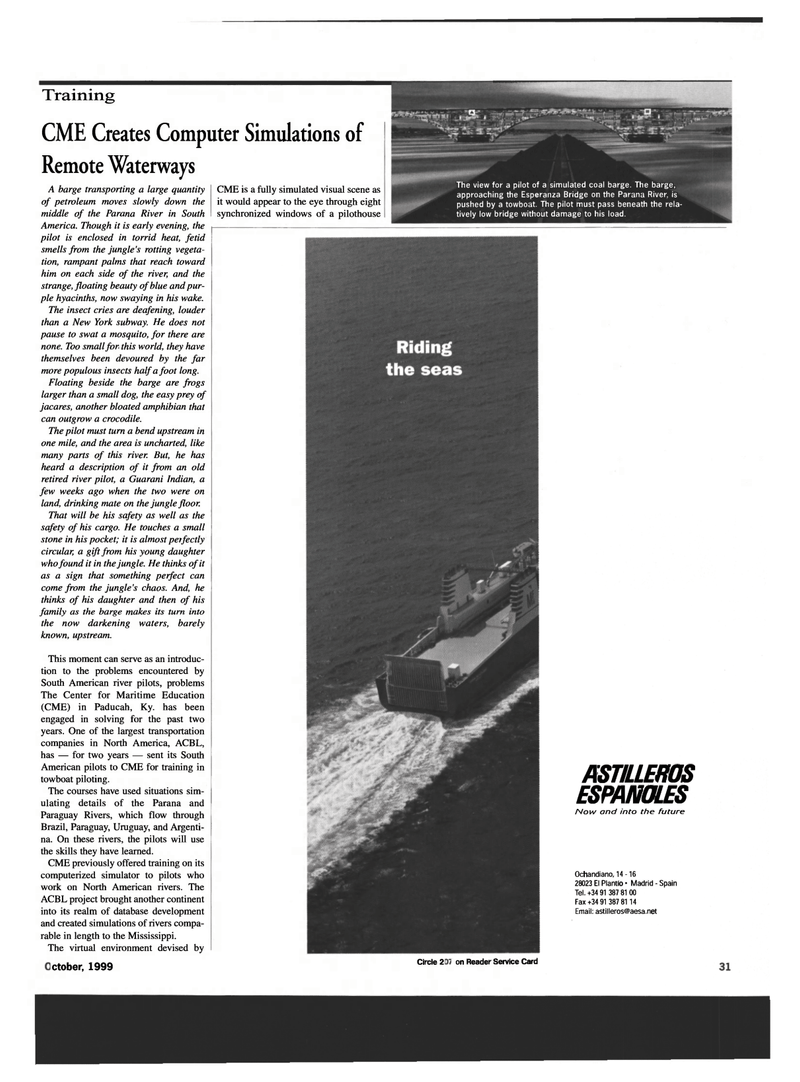
Page 31: of Maritime Reporter Magazine (October 1999)
Read this page in Pdf, Flash or Html5 edition of October 1999 Maritime Reporter Magazine
Circle 221 on Reader Service Card
ASTILLEROS ESPANOLES
Now and into the future
Ochandiano, 14 -16 28023 El Plantio • Madrid - Spain
Tel. +34 91 387 81 00
Fax +34 91 387 81 14
Email: [email protected]
Training
CME Creates Computer Simulations of
Remote Waterways
A barge transporting a large quantity of petroleum moves slowly down the middle of the Parana River in South
America. Though it is early evening, the pilot is enclosed in torrid heat, fetid smells from the jungle's rotting vegeta- tion, rampant palms that reach toward him on each side of the river, and the strange, floating beauty of blue and pur- ple hyacinths, now swaying in his wake.
The insect cries are deafening, louder than a New York subway. He does not pause to swat a mosquito, for there are none. Too small for this world, they have themselves been devoured by the far more populous insects half a foot long.
Floating beside the barge are frogs larger than a small dog, the easy prey of jacares, another bloated amphibian that can outgrow a crocodile.
The pilot must turn a bend upstream in one mile, and the area is uncharted, like many parts of this river. But, he has heard a description of it from an old retired river pilot, a Guarani Indian, a few weeks ago when the two were on land, drinking mate on the jungle floor.
That will be his safety as well as the safety of his cargo. He touches a small stone in his pocket; it is almost perfectly circular, a gift from his young daughter who found it in the jungle. He thinks of it as a sign that something perfect can come from the jungle's chaos. And, he thinks of his daughter and then of his family as the barge makes its turn into the now darkening waters, barely known, upstream.
This moment can serve as an introduc- tion to the problems encountered by
South American river pilots, problems
The Center for Maritime Education (CME) in Paducah, Ky. has been engaged in solving for the past two years. One of the largest transportation companies in North America, ACBL, has — for two years — sent its South
American pilots to CME for training in towboat piloting.
The courses have used situations sim- ulating details of the Parana and
Paraguay Rivers, which flow through
Brazil, Paraguay, Uruguay, and Argenti- na. On these rivers, the pilots will use the skills they have learned.
CME previously offered training on its computerized simulator to pilots who work on North American rivers. The
ACBL project brought another continent into its realm of database development and created simulations of rivers compa- rable in length to the Mississippi.
The virtual environment devised by )ctober, 1999 33
CME is a fully simulated visual scene as it would appear to the eye through eight synchronized windows of a pilothouse
The view for a pilot of a simulated coal barge. The barge, approaching the Esperanza Bridge on the Parana River, is pushed by a towboat. The pilot must pass beneath the rela- tively low bridge without damage to his load.

 30
30

 32
32
